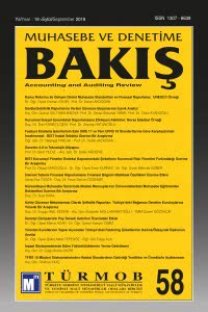KURAL-BAZLI VE İLKE-BAZLI FİNANSAL RAPORLAMA STANDARTLARININ KARŞILAŞTIRILMASI
Amerikan Genel Kabul Görmüş Muhasebe Standartlarının US GAAP kural-bazlı ve Uluslararası Finansal Raporlama Standartlarının UFRS ise ilke-bazlı olduğu yönünde genel bir görüş birliği vardır. Ama kural bazlı veilke bazlı standartlar arasındaki fark tam olarak ortaya koyulmamıştır ve yoruma açıktır. Bu çalışmanın amacı öncelikle kural-bazlı ve ilke-bazlı standartların arasındaki ayrımı incelemektir. US GAAP ile UFRS’nin birbirineyakınsaması sürecinde bu ayrımın incelenmesi, UFRS’nin gelecekte alacağı şekil açısından çok büyük önem taşımaktadır. Bu bağlamda, bu her iki standardın birbirine yakınsamasının ve ilke-bazlı olarak kabul edilen Uluslararası Finansal Raporlama Standartlarının Türkiye’de en iyi şekilde uygulanması için öneriler tartışılmıştır
Anahtar Kelimeler:
UFRS, US GAAP, ilke-bazlı, kural-bazlı
Comparison of Rule-Based and Principal-Based Financial Reporting Standards
There is a concensus on the idea that US GAA P is rule-based and IFRS is principle –based. But the differencebetween rule-based and principle-based standards is not well defined and open to dicussion. The purpose of thispaper is to investigate the difference between the two types of standards. The investigation of this difference gains importance during the convergence process of US GAAP and IFRS. In this study, we discuss the implications of this convergence on IFRS and provide recommendations for best application of IFRS in Turkey
Keywords:
IFRS, US GAAP, rule-based, principle-based,
___
- Akdoğan, N., Tenker, N. (1998). Finansal tablolar ve mali analiz teknikleri. Genişletilmiş 6. Baskı Gazi Kita- bevi. Ankara
- Alexander, D., Jermakowicz, E. (2006). A true and fair view of the principles rules debate. Abacus v.42 n.2.
- Bayazıtlı, E. ve Çelik, O. (2004) Muhasebe eğitiminin kalitesinin artırılmasında ilk adım: Yükseköğretim kurum- larında muhasebe eğitiminin etkinliğinin analizi. XXIII. Türkiye Muhasebe Eğitimi Sempozyumu, Antalya.
- Bennet, B., Bradbury, M., Prangnell, H. (2006). Rules, principles and judgments in accounting standards. Aba- cus v.42 n.1 sf. 189-204.
- Beston, G.J., Bromwich, M., Wagenhofer, A. (2006). Principles- versus rules-based accounting standards: the FASB’s standard setting strategy. Abacus v.42 n.2 sf. 165-188.
- CICA (1995). Professional judgment and the auditor. Canadian Institute of Chartered Accountants. Toronto
- Çelik, O. (2003). Muhasebe Kuramı ve Uygulamaları Açısından Muhasebe Bilgilerinin Niteligi. Ankara Üniver- sitesi SBF Gelişme ve Toplum Araştırmaları Merkezi Tartışma Metinleri No:52
- Delaney, R.D, Epstein, J.B., Nach, R., Budak, S. W. (2004). GAAP: Interpretation and Application of Gene- rally Accepted Accounting Principles.Wiley, ABD
- Dyckman, T.R., Dukes, R.E., Davis, C.J. (1998). Intermediate Accounting. 4. Baskı. Irwin McGraw-Hill: New York, ABD.
- Gibbins, M. and Mason, A. K., (1988). Professional Judgment in Financial Reporting. CICA Research Studi- es Series. Toronto: Canadian Institute of Chartered Accountants
- Gibbins, M., S. Salterio, and A. Webb, 2001. “Evidence About Auditor-Client Management Negotiation Concer- ning Client’s Financial Reporting,” Journal of Accounting Research 39 sf: 535-563.
- Hartman, B.P., Harper, R.M., Knoblett, J.A., Reckers, P.M.J. (1995).Intermediate Accounting. West Publishing. New York
- IASB (2005 a) Qualitative characteristics 2: Qualitative characteristics other than relevance and reliability. IASB meeting .Information for observers.22 June 2005.London
- IASB (2005 b) Qualitative characteristics 1: Relevance and reliability. IASB meeting .Information for obser- vers.17 May 2005.London
- Kaya, İ. (2003). FASB-IASB anlaşması ve global finansal muhasebe standartlarına doğru. 6. Türkiye Denetim Sempozyumu.
- Kershaw, D. (2005). Evading enron: taking principles too seriously in accounting regulation. Modern Law Re- view. v.68 n.4
- Laureen, A.M., Bartov, E., Fairfield, P., Hirst, E.D., Iannaconi, T.E., Mallet, R., Schrand, C.M., Skinner, D.J. ve Vincent, L. (2003) Evaluating concepts-based vs. rules based approaches to standard setting. Accounting Hori- zons. 17(1), 73 – 89.
- Nelson, M.W. (2002). Behavioral evidence on the effects of principles-based and rules-based standards. Wor- king paper: Cornell University.
- Psaros, T., Trotman, K.T. (2004). The impact of the type of accounting standards on preparers judgments. Aba- cus . vol. 40 no.1 sf.76-93.
- Schipper, K. (2003). Principles based accounting standards. Accounting Horizons. vol.17 no.1 march. sf. 61-72. Securities and Exchange Comission (1999). Audit committie disclosure release. No 34-42266. Washington D.C.
- TMSK (2006). Türkiye Muhasebe/Finansal Raporlama Standartları: uluslararası finansal raporlama standartları (IFRS/IAS) ile uyumlu Türkiye Muhasebe Standartları (TMS/TFRS). TMSK yayınları no:1, 2006
- Verschoor, C. C., (2006). IFAC Committee Proposes Guidance for Achieving Ethical Behavior. Strategic Finan- ce V.88, Iss. 6.
- Webster, E., Thornton, D.B. (2004). Earnings quality under rules vs. principles based accounting standards: a test of skinner hypothesis. Working paper: Queen’s University School of Business.
- Yalkın, Y.K., Demir, V. ve Demir, D. (2006) Uluslararası finansal raporlama standartları ve Türkiye’de finansal raporlama standartlarının gelişimi. Mali Çözüm. Kongre Özel Sayısı, 291 – 307.
- Zaif, F. (2004) Muhasebe eğitiminde yeni yaklaşımlar XXIII. Türkiye Muhasebe Eğitimi Sempozyumu, An- talya.
- ISSN: 1307-6639
- Yayın Aralığı: Yılda 3 Sayı
- Başlangıç: 2000
- Yayıncı: TÜRMOB
Sayıdaki Diğer Makaleler
Yusuf SÜRMEN, Abdulkerim DAŞTAN
HİLELERİN ÖNLEMESİ VE ORTAYA ÇIKARILMASINA YÖNELİK PROAKTİF YAKLAŞIMLAR
CAPM ANOMALİLERİNİN İMKB VERİLERİ İLE TEST EDİLMESİ
Mehmet ERYİĞİT, M Akif AYARLIOĞLU
KURAL-BAZLI VE İLKE-BAZLI FİNANSAL RAPORLAMA STANDARTLARININ KARŞILAŞTIRILMASI
Çağnur KAYTMAZ BALSARI, A Fatih DALKILIÇ
MUHASEBECİ - MÜKELLEF ÇATIŞMASI
